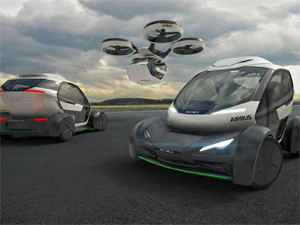



Date:10/03/17
 We're still waiting for the flying car, and it looks like we might still be waiting for a very long while. But in the meantime, Airbus has revealed a concept vehicle which is part self-driving car, part flying machine called a Pop.Up. It's like something out of a sci-fi movie, which is fitting considering the chances that it will ever actually exist.
We're still waiting for the flying car, and it looks like we might still be waiting for a very long while. But in the meantime, Airbus has revealed a concept vehicle which is part self-driving car, part flying machine called a Pop.Up. It's like something out of a sci-fi movie, which is fitting considering the chances that it will ever actually exist.
The Pop.Up, unveiled during the 87th Geneva International Motor Show, is what Airbus bills as "the first modular, fully electric, zero emission concept vehicle system designed to relieve traffic congestion in crowded megacities."
The concept has a few parts. First, there's an AI platform that would survey routes and make decisions the best way to get from Point A to Point B. Then there's the car itself: "[a passenger capsule] designed to be coupled with two different and independent electric propelled modules (the ground module and the air module)," Airbus says in a press release. The company also leaves the door open to transporting the capsules by hyperloop-like means, should the opportunity ever present itself.
Last year, Airbus unveiled the design of the Vahana, and as of February, the Vahana Medium page is still updating. So even though we haven't seen any real progress, it's fair to say that Airbus hasn't given up on it quite yet.
The Vahana, which only flies, might be seen as a precursor to this new experiment. Airbus hopes to get the former up in the air by 2020, and to make something like the Pop.Up a physical reality in seven to ten years, though when it comes to flying cars, you need to take those estimates with a bolder-sized grain of salt.
Airbus unveils an autonomous, modular flying car concept
 We're still waiting for the flying car, and it looks like we might still be waiting for a very long while. But in the meantime, Airbus has revealed a concept vehicle which is part self-driving car, part flying machine called a Pop.Up. It's like something out of a sci-fi movie, which is fitting considering the chances that it will ever actually exist.
We're still waiting for the flying car, and it looks like we might still be waiting for a very long while. But in the meantime, Airbus has revealed a concept vehicle which is part self-driving car, part flying machine called a Pop.Up. It's like something out of a sci-fi movie, which is fitting considering the chances that it will ever actually exist.The Pop.Up, unveiled during the 87th Geneva International Motor Show, is what Airbus bills as "the first modular, fully electric, zero emission concept vehicle system designed to relieve traffic congestion in crowded megacities."
The concept has a few parts. First, there's an AI platform that would survey routes and make decisions the best way to get from Point A to Point B. Then there's the car itself: "[a passenger capsule] designed to be coupled with two different and independent electric propelled modules (the ground module and the air module)," Airbus says in a press release. The company also leaves the door open to transporting the capsules by hyperloop-like means, should the opportunity ever present itself.
Last year, Airbus unveiled the design of the Vahana, and as of February, the Vahana Medium page is still updating. So even though we haven't seen any real progress, it's fair to say that Airbus hasn't given up on it quite yet.
The Vahana, which only flies, might be seen as a precursor to this new experiment. Airbus hopes to get the former up in the air by 2020, and to make something like the Pop.Up a physical reality in seven to ten years, though when it comes to flying cars, you need to take those estimates with a bolder-sized grain of salt.
Views: 351
©ictnews.az. All rights reserved.Similar news
- Azerbaijani project to monitor disease via mobile phones
- Innovative educational system to be improved under presidential decree
- NTRC prolongs license of two TV and radio organizations for 6 years
- Azerbaijan establishes e-registry for medicines
- Azerbaijani museum introduces e-guide
- Nar Mobile opens “Nar Dunyasi” sales and service center in Siyazan city
- International conference on custom electronic services held in Baku
- OIC secretary general to attend COMSTECH meeting in Baku
- Azerbaijan develops earthquake warning system
- New law to regulate transition to digital broadcasting in Azerbaijan
- Azerbaijani State Social Protection Fund introduces electronic digital signature
- Intellectual traffic management system in Baku to be commissioned in December
- Tax Ministry of Azerbaijan started receiving video-addresses
- World Bank recommends Azerbaijan to speed up e-service introduction in real estate
- Azerbaijan to shift to electronic registration of real estate





















